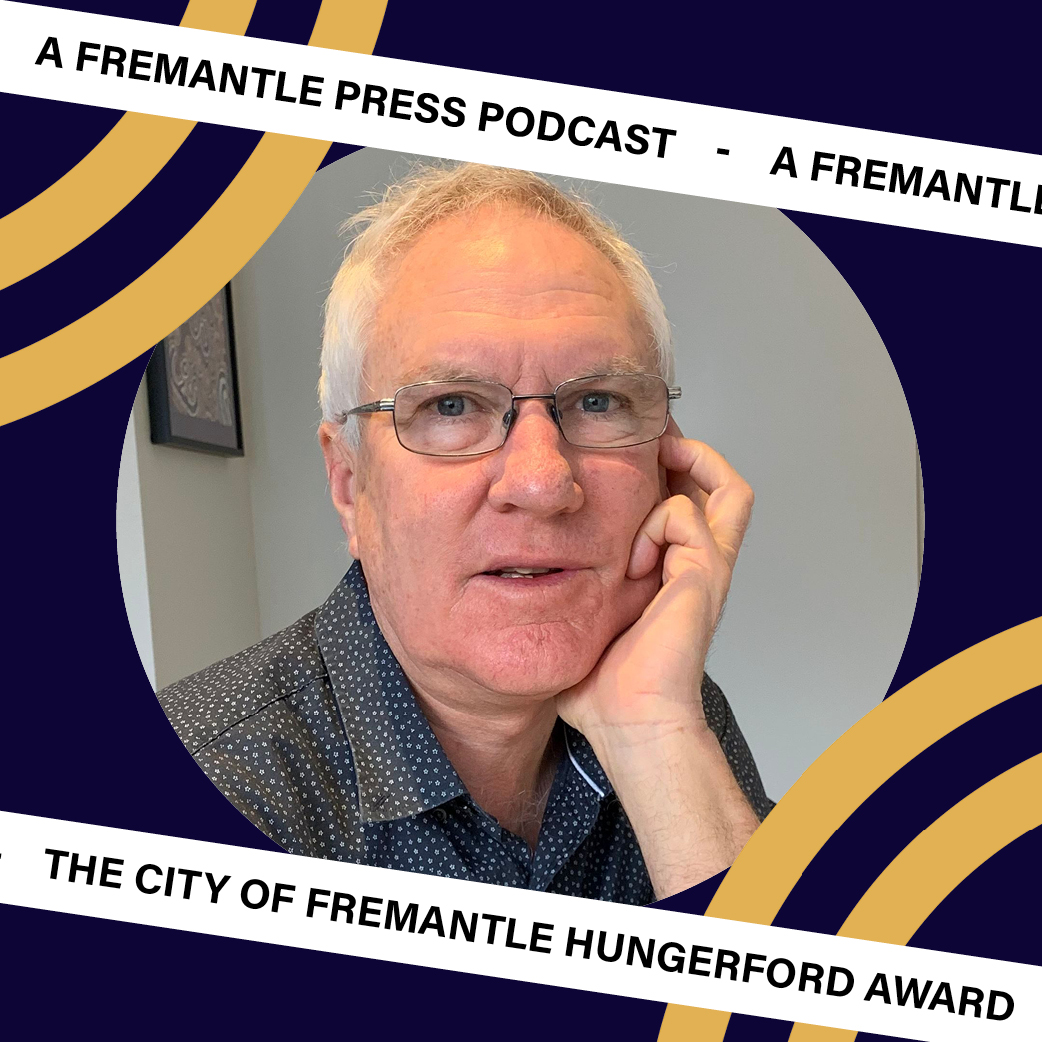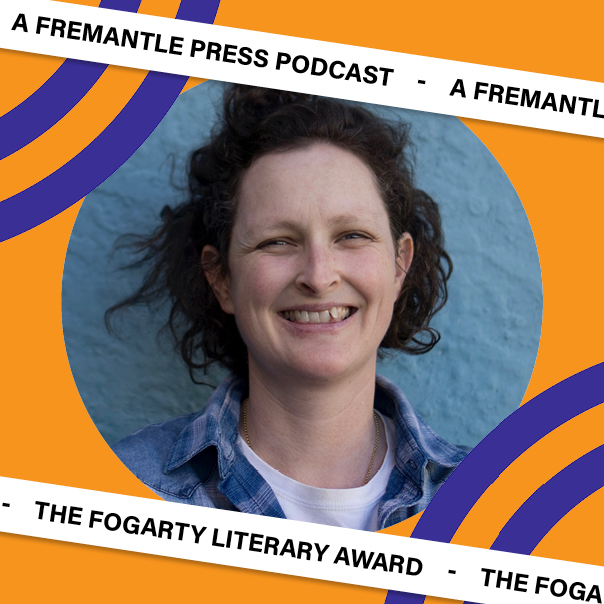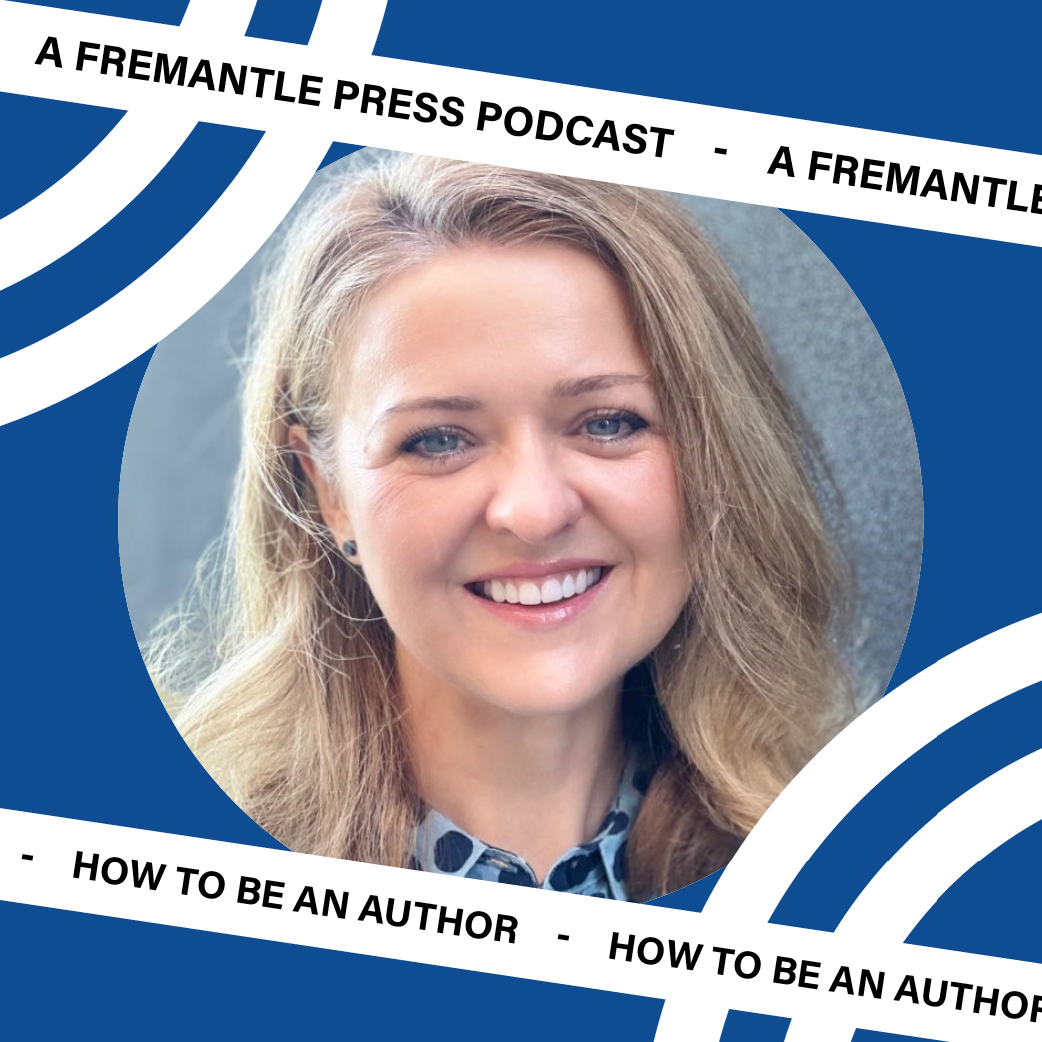Episode Transcript
[00:00:00] Speaker A: Foreign hello and welcome to the Fogarty Literary Award podcast.
Today we are recording in Wallulap in Whadjuk Nyungar Buja and I'd like to acknowledge our first storytellers along with Noongar elders past and present.
My name is Katherine Allum. In 2023, I. I won the Fogarty Literary Award for my novel the Skeleton House.
The Fogarty Literary Award is proudly sponsored by the Fogarty Foundation, Fremantle Press and the center for Stories.
The biennial prize is awarded to an unpublished manuscript by a Western Australian author aged between 18 and 35 for a work of adult fiction, narrative, nonfiction or young adult fiction.
The range and depth of literary talent in our state is something to be very proud of. When I was shortlisted, it was a coming of age moment for me as a writer. An official welcome into the WA writing community.
Today's guest is Jessica Baker. But first, I'm here with Georgia Richter, publisher at Fremantle Press.
Could you describe why you chose this manuscript for the shortlist?
[00:01:15] Speaker B: It's the kind of novel that I really would have liked to discover as a young woman.
Out there. In here is an adept exploration of the many issues that younger women face as they're growing into being their best selves and learning about the world around them. So some of the things that the novel explores include gaslighting in the workplace and in relationships, and also how to know when it is right to create boundaries around yourself.
It's also a great novel about the power of the sisterhood between actual sisters and also between women friends.
All in all, Jessica Baker has written an entertaining novel that I think creates a space for readers to recognise themselves in it too.
[00:01:57] Speaker A: Yeah, wow. I think back on some of the novels that made a big impact on me because they tackled some of those more adult concepts that as a woman you have to grow into and discovering it at that pivotal age. That's a very special type of book to write.
Jessica Baker is a writer based in Kununurra, Western Australia.
Her work explores abstract concepts like consent and love and the intricacies of human emotion.
She commenced her career as a journalist in 2020, transitioning into court and crime reporting before moving to the UK and worked as a foreign news reporter until 2024. When Jessica is not writing, she works as a marketing and media officer and spends her time exploring the dramatic landscapes of the Northwest.
Her shortlisted manuscript is out there in here.
Jessica, congratulations on getting this far and welcome to the podcast.
[00:02:55] Speaker C: Hi, Katherine, thank you so much for having me.
[00:02:57] Speaker A: When was it that made you decide to apply to the Fogarty Literary Award. I would love to hear about the moment you actually press submit.
[00:03:05] Speaker C: Well, I think it came down to really lucky timing. I just finished a round of edits to my manuscript when I saw a call out for Fogarty Literary Award submissions. Meaning I was really in the weeds of my words.
No one had read them and handing them over to someone else. Submitting the manuscript to be considered for the award felt quite exposing.
It's surreal and strange to do something like that, to submit a work you've been chipping away at for years, especially from your laptop at the dining table in your house, which is how it was for me. There was certainly a moment of relief. It can feel when you're editing a manuscript as if it will never be ready for someone else's eyes. You read through it again and you catch all these things that you want to change or remove. So submitting the manuscript was relieving because the decision of whether it was ready or not, whether it was good or not, was out of my hands. Once it was submitted, there was nothing more I could do. There was a deadline for submissions and it had to go whether it was completely perfect or not. And I think at that point I was quite happy to let it go.
[00:04:10] Speaker A: Yeah, congrats again on taking that step to press the button, because that's one of the hardest things to do as a writer, is sending it off into the world. And I know our listeners would love to hear more about your manuscript. Could you just describe in your own words what the story's about?
[00:04:26] Speaker C: Yeah, of course.
Out there in here is a coming of age story about Beth Green, a 25 year old court news reporter who feels trapped by her life in Brisbane, Queensland, and and her younger sister Alex, who is a contrastingly sunny person.
Following a series of draining days in courtrooms, which are typical for Beth, she is spurred to do what many of us might dream about doing, but never actually do, either for lack of courage or because we don't quite hit rock bottom like Beth does.
But she leaves her home and Alex and all her comforts. She switches off her phone and locks it away.
She hires a van and she just drives. She drives without a plan to wherever her curiosity takes her.
She's never ventured far from home before. And being away, meeting new people, some really lovely people, she gains a new perspective on a situation.
Beth is dealing with unresolved trauma and her story explores themes related to disillusionment, love, abuse and the fantasy of escape. But it does so with a humour and warmth and lightness that I hope makes it an accessible and enjoyable read. Its purpose is merely to entertain and make readers feel seen and offer one possible answer to the question of whether we can solve the problems that live in here by being out there, whether we can outrun our own minds.
[00:05:53] Speaker A: Wow. That urge to sort of pack up and disappear when things are very stressful, I'm sure, is a very common thing. We've all entertained when we've been very stressed out. So writing a book about it, I bet that'll resonate with many people.
Would you care to share a reading from the manuscript?
[00:06:11] Speaker C: Yeah, sure. So this extract is from early in the manuscript, after Beth meets a man named Gus at the Gold coast who is someone you could call a romantic interest.
They have dinner together and she has a nice time but leaves feeling flat, although isn't sure why and this scene takes place the following day in her home where she lives with her sister Alex and their cat Miffy.
The morning after she met Gus, Beth was eating breakfast at the kitchen bench, staring blankly into a bowl of Cheerios with her legs folded up on a stool when Alex pushed the front door open with such force that it banged against the wall behind it.
Hello? Alex called while rounding a corner to arrive in the kitchen. She dropped her yoga mat on the floor and poured a mountain of biscuits into Miffy's bowl. How are we?
Morning, beth replied. Tiny cream and yellow rings floated slowly through the milky pool in her dish. You okay? You're in that? Alex leaned over the kitchen bench to get a closer look at her sister spacey zone of yours.
I'm fine. Beth smiled. I went to the beach yesterday while you were at work. I think I told you.
Yeah, you mentioned you were going to.
Well, I met someone while I was down there. Fuck off.
Beth laid bare the details of how they met, what he told her about himself, his choice in drink and meal at the restaurant they went to, and how he asked for her phone number, not her Instagram handle at the end of the night.
Beth, alex said, that was absolutely 100% a date. Did you have a good time?
I think so. Beth shrugged and stirred the Cheerios with her spoon. It won't go anywhere. You don't know that. You just met the guy.
He lives on the Gold coast, so you would love a bit of distance. He'll be less likely to pop over randomly and mess with your routine. True. Beth held her spoon like it was a gavel and stared at a spot behind Alex's head. That's a good point.
Thank you. So why don't we think about getting to know him before you rule him out.
Beth's love and relationship history had fostered in her a tendency to catastrophise. Despite knowing Gus for less than a day, she had already visualised an entire relationship with him from its infancy to when it withered away.
She imagined Gus introducing her to his family and friends. She imagined him traveling to see her in Brisbane for months before deciding he hated the distance. She imagined him moving into her home and then beginning to argue. Gus feeling that Beth did not appreciate him. Beth missing her quiet mornings, Gus calling her boring, Beth floating the idea of a break. Gus yelling, throwing his things in plastic bin bags and leaving the only traces of him in a home. A few rolled up pairs of underwear and a toothbrush with squash bristles.
[00:08:44] Speaker A: Wow, I love that. When you were writing this novel, did you draw on your journalistic experiences or personal experiences or perhaps a bit of both?
[00:08:56] Speaker C: Yeah, absolutely. I drew on my own journalistic experiences which are very much linked to my personal experiences.
When I started writing the manuscript, I just left a job as a court news reporter. I really love being a journalist and I can definitely see myself returning to the profession one day, but I don't think I would be a court reporter again.
It is really hard to sit in a courtroom every day and listen to the terrible things that people are capable of doing to each other.
And I used to say that I was numb to the horror of some of the stories I had to report.
But I don't know if that's true. I think it takes a toll.
And when I left I had had a gut full. I could have just looked to exit court and crime reporting, but I'd always wanted to live in London in my 20s so I booked a one way ticket over there.
I traveled around Europe with my boyfriend for a bit and then with some girlfriends and then by myself. And I settled in London and worked as a foreign news reporter.
And I love that. But yeah, court news reporting was tough. And my experience in that area was fresh in my mind when I started writing this manuscript.
Which is why Chapter one opens with Beth in a courtroom.
[00:10:09] Speaker A: And that's a very unique experience to draw on. How long have you been writing this manuscript?
[00:10:15] Speaker C: I have been working on this manuscript since April 2023.
It's been a scrappy process as I said. Just before I started writing the manuscript, in the weeks after I left my job in Brisbane as a court news reporter, I stayed with my boyfriend in regional Western Australia for a month and wrote every day. And then when that Month was up, I closed my laptop. We drove back across the country to Brisbane and left Brisbane for Europe. And I didn't work on the manuscript for several months while I traveled and found a job and flat and settled in London.
When I started writing again, it was in the hours before and after work, including on the tube and in line for coffees and on my lunch break. Sometimes I would just go to Google Docs rather than Instagram on my phone.
Then when I moved back to Australia to Kununurra, I spent a couple of months finishing the manuscript before I needed to earn some money and started working again. And since then I've just been writing as before, around their day jobs.
[00:11:17] Speaker A: Amazing. It's always wonderful to hear about how writers fit in their craft with their everyday life.
So, like you, I drafted my novel the Skeleton House in London. Sort of daydreaming on the tube. Yeah. So I drafted it there as well. And it was about a regional town in Nevada and I was, you know, my mind was elsewhere.
The process of writing a novel takes so long. Your description really resonates with mine that over traveling and jobs and you just have to fit it in where you can fit it in.
[00:11:50] Speaker C: And you have to keep the kind of flow going that whole time while you're in all these different places and different states of mind. But yeah, if you've got a strong drive within you to tell that story, I think it's possible.
[00:12:05] Speaker A: Yeah, it really is about that. If you know in your heart that you need to tell this story, it'll find its way. Thank you so much. As we wrap up, is there anything else you'd like to tell our listeners today?
[00:12:17] Speaker C: I think I would just like to encourage other writers to start or keep at the project that inspires them.
If it gets frustrating, which if my experience is anything to go off, it will get frustrating at points, you can always take a break and come back to it. The world needs more art. I think so, yeah. Those are my two cents.
[00:12:41] Speaker A: Listeners, you can meet Jessica Baker at the 2025 Fogarty Literary Award announcement at Government House ballroom on Tuesday, 3rd of June. Tickets are free and available from the Fremantle Press website.
I'm Kathryn Allum and I look forward to joining you in our next Fogarty podcast.


